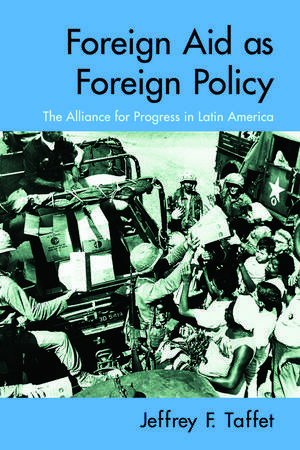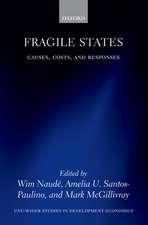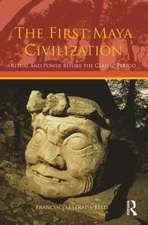Foreign Aid as Foreign Policy: The Alliance for Progress in Latin America
Autor Jeffrey Taffeten Limba Engleză Hardback – 23 apr 2007
| Toate formatele și edițiile | Preț | Express |
|---|---|---|
| Paperback (1) | 244.13 lei 6-8 săpt. | |
| Taylor & Francis – 23 apr 2007 | 244.13 lei 6-8 săpt. | |
| Hardback (1) | 825.43 lei 6-8 săpt. | |
| Taylor & Francis – 23 apr 2007 | 825.43 lei 6-8 săpt. |
Preț: 825.43 lei
Preț vechi: 1106.00 lei
-25% Nou
Puncte Express: 1238
Preț estimativ în valută:
157.97€ • 164.49$ • 133.50£
157.97€ • 164.49$ • 133.50£
Carte tipărită la comandă
Livrare economică 07-21 martie
Preluare comenzi: 021 569.72.76
Specificații
ISBN-13: 9780415977708
ISBN-10: 0415977703
Pagini: 322
Ilustrații: 16 halftones
Dimensiuni: 152 x 229 x 23 mm
Greutate: 0.76 kg
Ediția:1
Editura: Taylor & Francis
Colecția Routledge
Locul publicării:Oxford, United Kingdom
ISBN-10: 0415977703
Pagini: 322
Ilustrații: 16 halftones
Dimensiuni: 152 x 229 x 23 mm
Greutate: 0.76 kg
Ediția:1
Editura: Taylor & Francis
Colecția Routledge
Locul publicării:Oxford, United Kingdom
Cuprins
Introduction: The Politics of Foreign Aid, Chapter 1: Changing Course in Latin America: Influences from Eisenhower, Modernization Theorists, Kennedy, and the Cuban Revolution, Chapter 2: Implementing the Alliance for Progress: The Initial Theoretical, Political, Management, and Marketing Problems, Chapter 3: Kennedy to Johnson: Giving Up on Idealism and Worrying About Political Instability, Chapter 4: Chile and the Alliance for Progress: Fighting Allende and Pushing Frei, Chapter 5: Brazil and the Alliance for Progress: Undermining Goulart and Rewarding the Military, Chapter 6: The Dominican Republic and the Alliance for Progress: Using Aid to Clean Up the Post-Trujillo and Postintervention Messes, Chapter 7: Colombia and the Alliance for Progress: Pushing Reliable Allies to Demonstrate That Aid Could Work, Chapter 8: The Alliance for Progress in the Late 1960s: The Slow Fade to Irrelevance, Conclusion, Appendix A: Address by President John F. Kennedy at the White House Reception for Members of the Diplomatic Corps of the Latin American Republics, March 13, 1961, Appendix B: The Charter of Punta Del Este: Establishing an Alliance for Progress within the Framework of Operation Pan America, August 17, 1966, Appendix C: President Lyndon B. Johnson’s Remarks on the Alliance for Progress to Representatives of the Countries of Latin America, November 26, 1963, Appendix D: Declaration of the Presidents of America, Punta del Este, Uruguay, April 14, 1967, Appendix E: Key Officials in the Alliance for Progress Era, Endnotes, Index
Notă biografică
Jeffrey Taffet is Assistant Professor of History at the United States Merchant Marine Academy.
Recenzii
"[Foreign Aid as Foreign Policy] is an outstanding book on an important topic. This book is destined to be the standard reference work on the [Alliance for Progress]. It is well researched, well written, and provides a compelling story of a failure that was not as noble as it seemed."
—Journal of American History
"Based largely on newly released U.S. government sources, Taffet’s clearly written study is a valuable—and timely—contribution that sheds new light on the most ambitious U.S. effort to reshape Latin America in its own image."
—American Historical Review
"Foreign Aid as Foreign Policy brilliantly makes the failed Alliance for Progress of the 1960s part of our ‘usable past,’ because it warns against the temptation of letting short-term politics corrupt long-term development. This book should be read not only by those interested in Latin America but by all students of international affairs."
—Alan McPherson, author of Intimate Ties, Bitter Struggles: The United States and Latin America since 1945
"Foreign Aid as Foreign Policy provides a compelling analysis of the Alliance for Progress. Taffet shows how and, importantly, why the original objectives of the Alliance were not met. Anyone interested in US-Latin American relations will profit from reading this exemplary study."
—William O. Walker III, author of Opium and Foreign Policy
"Taffet has written a path-breaking, long overdue history of the Alliance for Progress that is sure to become the standard reference on the topic. Lucid and balanced, Foreign Aid as Foreign Policy reveals the ironies and ideals of foreign aid, showing why—in the service of realpolitik—it was such a blunt and unwieldy tool."
—Elizabeth Cobbs Hoffman, author of All You Need is Love: The Peace Corps and the Spirit of the 1960s
"Foreign Aid as Foreign Policy should now be regarded as the most important work on the history of the Alliance for Progress."
—Hispanic American Historical Review
"This is an outstanding book on an important topic... It is destined to be the standard reference work on the topic. It is well researched, well written, and provides a compelling story." --The Journal of American History
—Journal of American History
"Based largely on newly released U.S. government sources, Taffet’s clearly written study is a valuable—and timely—contribution that sheds new light on the most ambitious U.S. effort to reshape Latin America in its own image."
—American Historical Review
"Foreign Aid as Foreign Policy brilliantly makes the failed Alliance for Progress of the 1960s part of our ‘usable past,’ because it warns against the temptation of letting short-term politics corrupt long-term development. This book should be read not only by those interested in Latin America but by all students of international affairs."
—Alan McPherson, author of Intimate Ties, Bitter Struggles: The United States and Latin America since 1945
"Foreign Aid as Foreign Policy provides a compelling analysis of the Alliance for Progress. Taffet shows how and, importantly, why the original objectives of the Alliance were not met. Anyone interested in US-Latin American relations will profit from reading this exemplary study."
—William O. Walker III, author of Opium and Foreign Policy
"Taffet has written a path-breaking, long overdue history of the Alliance for Progress that is sure to become the standard reference on the topic. Lucid and balanced, Foreign Aid as Foreign Policy reveals the ironies and ideals of foreign aid, showing why—in the service of realpolitik—it was such a blunt and unwieldy tool."
—Elizabeth Cobbs Hoffman, author of All You Need is Love: The Peace Corps and the Spirit of the 1960s
"Foreign Aid as Foreign Policy should now be regarded as the most important work on the history of the Alliance for Progress."
—Hispanic American Historical Review
"This is an outstanding book on an important topic... It is destined to be the standard reference work on the topic. It is well researched, well written, and provides a compelling story." --The Journal of American History
Descriere
Foreign Aid as Foreign Policy presents a wide-ranging, thoughtful analysis of the most significant economic-aid program of the 1960s, John F. Kennedy’s Alliance for Progress. Introduced in 1961, the program was a ten-year, multi-billion-dollar foreign-aid commitment to Latin American nations, meant to help promote economic growth and political reform, with the long-term goal of countering Communism in the region. Considering the Alliance for Progress in Chile, Brazil, the Dominican Republic, and Colombia, Jeffrey F. Taffet deftly examines the program’s successes and failures, providing an in-depth discussion of economic aid and foreign policy, showing how policies set in the 1960s are still affecting how the U.S. conducts foreign policy today. This study adds an important chapter to the history of US-Latin American Relations.




















